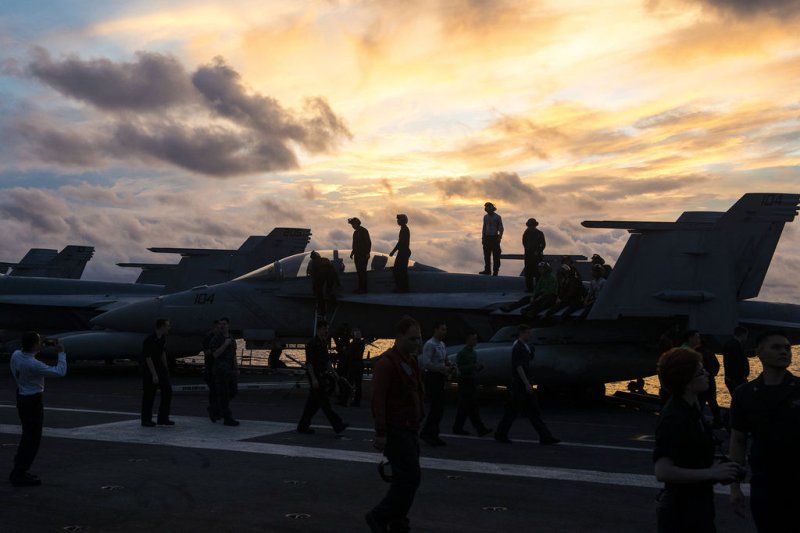Sailors stand on an F/A-18F Super Hornet aboard the USS Ronald Reagan (CVN 76) to get a better view of the fireworks during the ship's Independence Day celebration on July 4, 2016, in the South China Sea. Ronald Reagan, the Carrier Strike Group Five (CSG 5) flagship, is on patrol in the U.S. 7th Fleet area of responsibility supporting security and stability in the Indo-Asia-Pacific region. File Photo by James Mullen/U.S. Navy/UPI |
License Photo
Three ships and two support ships of the Pacific Fleet have left Russian waters to take part in the upcoming Russian-Chinese naval exercises in the South China Sea. The drills, which are scheduled on Sept. 12-19, will include maritime, land and air operations.
This is the fifth edition of the Sino-Russian "Sea Cooperation" drills, but it's the first time that such an unstable region was chosen to hold the exercises.
China claims 95 percent of the waters of the South China Sea and has territorial disputes with ASEAN countries -- Vietnam, Philippines, Malaysia and Brunei.
In July, the Permanent Court of Arbitration in The Hague ruled that China has no grounds to claim these islands and reefs in the South China Sea. The Chinese authorities refused to accept the court's decision.
Russia's objectives in the South China Sea
Foreign Ministry spokeswoman Maria Zakharova says Russia is not a party in this confrontation and is not going to get involved.
However, strategic analysts interviewed by RBTH see benefits for Russia if the disputed islands of the Spratly Archipelago and the Malacca Strait were under China's influence and beyond the influence of the United States and its allies in the region.
"Willingly or unwillingly, Russia supports China's claim to disputed islands in the South China Sea," says military expert Viktor Litovkin. "The construction of Chinese military infrastructure will provide Russia with protection in the area against U.S. Navy ships and the Aegis system and SM-3 and Tomahawk missiles."
Washington insists on the principle of freedom of navigation, which is at odds with the interests of China in the region. The placement of military infrastructure by Beijing on the Spratly Archipelago would eliminate the ability of U.S. warships to navigate these waters.
Russia-China military cooperation
"In the near future, this area will become home to China's aircraft carrier group," says Alexey Maslov, an academician with the National Research University Higher School of Economics. "Russia has recently been trying to significantly strengthen its military and military-technical cooperation with Beijing."
Maslov says the military partnership between the two countries is developing at a much better pace than a number of economic projects.
"The current goal of the drills is to test the ability of the naval forces of the two countries to work together to solve crises in East and Southeast Asia," he adds.
Maslov believes that Russia and China are exploring the possibility of a future political and military alliance. However, such an alliance is not likely to resemble NATO.
This article originally appeared at Russia Beyond the Headlines.















